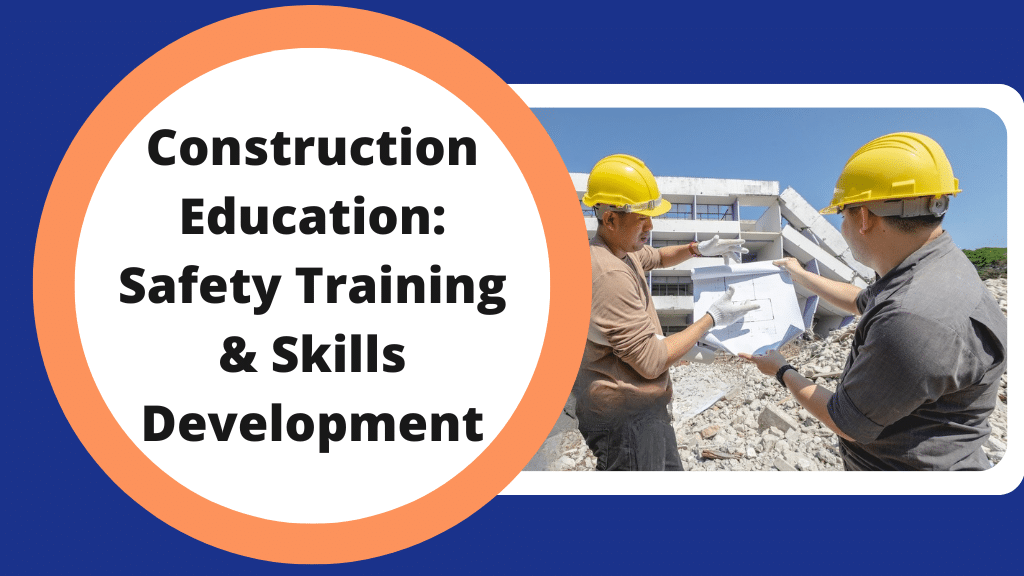May 20, 2025
Construction Education: Safety Training & Skills Development

The construction industry is built on skill, experience, and precision, but safety and training courses are what keep sites running properly and people protected. No matter if you’re laying bricks, wiring buildings, or operating heavy machinery, knowing how to do it safely and correctly is essential. And that’s where construction education comes in.
With the need for new housing on the rise, the construction sector is expanding. This growth has created a need for skilled workers as well as experienced professionals who can assess and teach them. Whether you’re thinking about assessing others’ skills or stepping up to train the next generation of workers, getting qualified through the right pathway can make all the difference.
Staying Safe on Site: Why Training is a Must in the Construction Industry
Construction sites are fast-moving environments where clear knowledge and quick decisions matter, so it’s no surprise that construction ranks among the highest-risk industries in the UK. Working at height, slips, trips and falls, operating heavy equipment, and managing hazardous substances like asbestos are all serious safety challenges for the industry. Without proper health and safety practices, even experienced workers can make mistakes that lead to injury or delay. Safety training provides the foundation everybody needs to operate tools, handle materials, and carry out tasks in line with current regulations.
Good safety training helps reduce accidents and keeps construction projects on schedule and within budget by lowering the chances of costly disruptions. The Health and Safety Executive (HSE) sets clear expectations for the industry, including training. From site inductions, manual handling to working in confined spaces, safety training makes sure that everyone on site knows how to protect themselves and others.
Consistency is also important. When everyone is trained to the same standard, teams work more efficiently and communication improves. There’s less confusion, fewer errors, and a better sense of professionalism.
As new technologies and methods are introduced across the industry, ongoing skills training becomes just as important as the initial qualifications. People need regular updates to stay compliant, confident, and ready to deliver high-quality results.
This ongoing need for training creates strong demand for qualified assessors and trainers.
Want to become a construction assessor? Here’s what you need to know
If you’re considering a move off the tools, to become someone who guides and supports others in learning the trade, becoming an assessor could be a logical next step. As an assessor, you’ll use your experience to help others prove their skills and meet the standards expected on-site.
Construction assessors don’t teach in the traditional sense. Instead, they observe learners on the job, ask questions, and review evidence of their work. They check that people can apply their training in real working conditions and meet the required criteria.
To become a qualified assessor, you’ll often need to complete the Level 3 Certificate in Assessing Vocational Achievement (CAVA). This course covers the full range of assessment methods, including observing learners in the workplace and evaluating their knowledge in training settings. It’s a flexible, recognised qualification that prepares you to assess in almost any environment.
The CAVA is ideal if you’re currently working in the built environment and want to support others who are learning. You don’t need to leave your organisation to take the course, and many people complete it alongside their regular work. Once qualified, you’ll be able to assess candidates for NVQs, apprenticeships, or on-site training programmes.
Thinking about teaching construction? Let’s talk about Level 3 AET
If you’re ready to move from hands-on work into teaching, the Level 3 Award in Education and Training (AET) is the place to start. This qualification is designed for people who want to teach in adult education, further education, or any sort of workplace training, including construction.
The AET gives you the core skills to plan lessons, deliver training, and support learners effectively. It covers the basics of teaching, like how to create a positive learning environment, use different methods to suit your learners, and check their understanding. It’s also a great way to build your confidence before stepping into the classroom or training centre.
You don’t need any prior teaching experience to begin the AET, but you do need to have solid knowledge in your subject area, which, for experienced tradespeople, is often already in place. Once qualified, you’ll be able to teach a range of construction subjects, from health and safety to trade-specific skills like plumbing, bricklaying, or electrical installation.
Many AET learners go on to teach in colleges, training centres, or within businesses that provide staff development. Some also continue on to higher-level teaching or assessing qualifications, like the Level 4 Certificate in Education and Training.
What makes a great construction trainer or assessor?
If you’ve built up experience on site, you already have the foundation needed to support others in learning the trade. Stepping into a training or assessing role is a natural next step for many skilled people who want to share their knowledge and help raise industry standards.
Strong assessors are observant, fair, and well-organised. You’ll be checking that people can do their jobs properly and safely, so attention to detail is important. You’ll also need to record your findings clearly and give feedback that helps learners improve.
Construction teachers and trainers focus more on guiding people through new material, so communication is essential. Whether you’re delivering sessions in a college, on-site, or in a training centre, you’ll need to explain things clearly and support learners with different levels of experience.
Both roles require patience, professionalism, and the ability to encourage others. You don’t have to be a perfect presenter, though, just someone who enjoys working with people and wants to make a difference.
Ready for the next step in your career in construction?
Whether you’re aiming to assess practical skills on-site or lead structured training sessions for various trades, the right qualification will give you the tools and confidence to succeed. Both the Level 3 CAVA and Level 3 AET are recognised across the construction and education sectors, and they’re flexible enough to fit around your existing work.
At Carlton Training, we specialise in helping experienced professionals make this transition. Our courses are built with you in mind, so we provide clear guidance, expert support, and practical learning that fits around your schedule.
Once qualified, you’ll be in a strong position to support others, share your knowledge, and contribute to raising standards across the UK’s construction sector. Whether you’re training new carpentry apprentices, guiding experienced workers through upskilling, or delivering workplace safety sessions, your role will be essential.
Ready to get started with an Adult Teaching Course or an Assessor course? Book online today.
Next ›‹ Previous
Back to Blog








